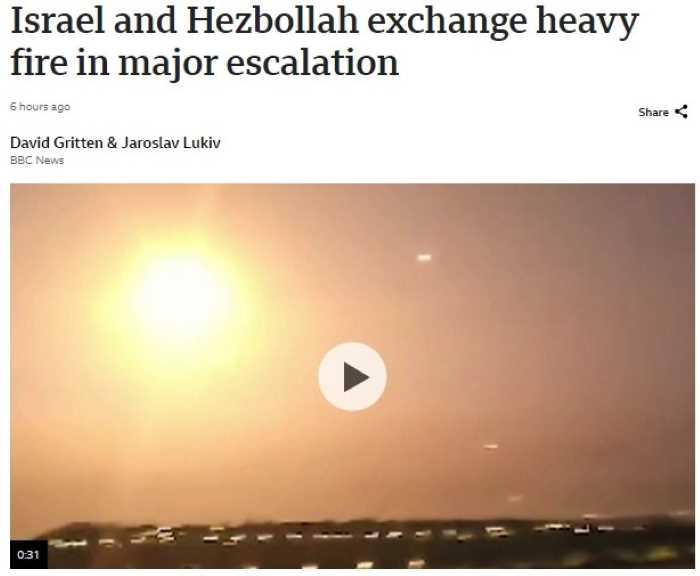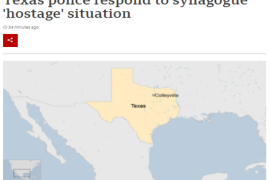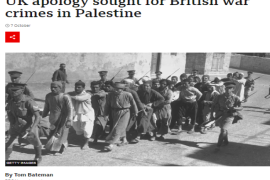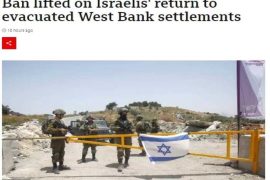Early on the morning of August 25th the Israeli air force carried out a series of strikes on Hizballah rocket launchers in southern Lebanon. Later, the Iran-backed terrorist organisation attacked northern Israel with over 200 rockets and around 20 drones.
The BBC News website published four separate items of content relating to that story on August 25th:
1. “Explosions over Israel as rockets fired from across Lebanon border” – filmed report, uncredited, no commentary.
2. “Israel and Hezbollah exchange heavy fire in major escalation” – originally titled “Israel strikes Hezbollah targets in Lebanon” and credited to Jaroslav Lukiv. Amended throughout the day and now credited to Jaroslav Lukiv and David Gritten.
3. Live Page – “Edited by Jack Burgess and Andrew Humphrey, with reporting from Alice Cuddy and Jon Donnison in Jerusalem, and Hugo Bachega in Lebanon”. Dated August 24 even though all the entries were made on August 25.
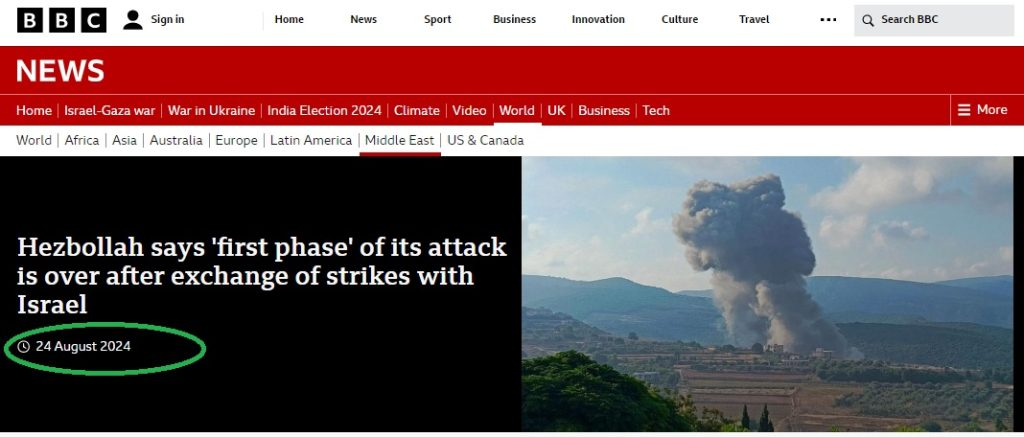
4. “Israel and Hezbollah say they don’t want war – but they are both ready for it” – Jon Donnison
Those four items include repetitive framing of a variety of relevant topics, including portrayal of the background and context to the events.
Presentation of the filmed report on the BBC News website’s ‘Middle East’ page told audiences that “tensions” has “escalated sharply” due to the assassination of Fuad Shukr on July 30th.
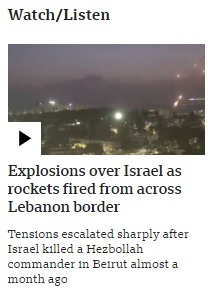
Given the BBC’s repeated promotion of Hizballah denials of responsibility for its attack three days earlier which murdered twelve children in Majdal Shams, it is perhaps not surprising to find that neither that report nor any of the others bothered to clarify that Shukr was assassinated because of his responsibility for that attack.
Lukiv & Gritten:
“Hezbollah said it had still managed to fire 320 rockets and drones at Israel in retaliation for the assassination of a senior commander.”
“It [Hizballah] described the barrage as a response to the assassination of senior military commander Fuad Shukr, who was killed in an Israeli strike in Beirut on 30 July.”
Live Page:
“Hezbollah has confirmed it began its attack on Sunday with a wave of rockets and drones, in response to the killing of its top commander Fuad Shukr in Beirut last month.” [05:01]
“In a statement Hezbollah said it had begun its response to the Israeli assassination of a senior commander Fuad Shukr last month.” [Jon Donnison 05:40]
“Hezbollah confirmed it has started “phase one” of an attack on Israel, beginning with a wave of hundreds of rockets and drones in response to the killing of its top commander Fuad Shukr on 30 July” [05:50]
“Hezbollah has described today’s action as the first phase of its response to the Israeli assassination of its senior commander Fuad Shukr on 30 July.” [Jon Donnison 08:37]
“Hezbollah says it “has completed the first phase” of an operation to avenge the death of its senior commander Fuad Shukr, killed last month in an Israeli strike in Beirut.” [Frank Gardner 10:00]
“For almost a month, Lebanon, Israel and the rest of the region waited for Hezbollah’s response to the Israeli killing of senior commander Fuad Shukr, the most high-profile leader of the group to have been assassinated in the current hostilities.” [Hugo Bachega 10:25]
“Hezbollah has been quick to signal that its retaliation for Israel’s assassination of its top commander Fuad Shukr last month is over for now – or at least its “first phase”.” [Orla Guerin 12:13]
“The group [Hamas] commends the “strong and focused response” to the assassination of senior Hezbollah commander Fuad Shukr.” [13:39]
“People have been waiting since the end of last month, when there were back-to-back assassinations of Hamas’s Ismail Haniyeh and Hezbollah’s Fuad Shukr.” [Orla Guerin 13:52]
“Hezbollah says it has completed the “first phase” of its retaliation for the killing of a top commander.” [Alice Cuddy 14:53]
“This development comes after Hezbollah said earlier today that it had “completed” the first phase of its retaliation against Israel – which followed the assassination of a top commander last month.” [16:00]
“In a televised address, translated by the Reuters news agency, he [Nasrallah] says Hezbollah’s response to the killing of its top commander Fuad Shukr was delayed for several reasons, including mass Israeli and US military mobilisation.” [16:31]
“It comes after Iran-backed Hezbollah “completed” the first phase of an extensive attack on Israel, in retaliation to the assassination of the group’s top commander last month.” [Malu Cursino 17:16]
“Unsurprisingly, he [Nasrallah] claimed that the attack on Israel earlier today, in retaliation for the Israeli assassination of senior commander Fuad Shukr last month in Beirut, was a success as it had been carried out as planned, and that it was over, an indication that no other major operation was being prepared, at least for now.” [Hugo Bachega 18:13]
“The armed group claims the strikes were a response to the killing of top commander Fuad Shukr in July” [Jack Burgess 18:46]
Donnison: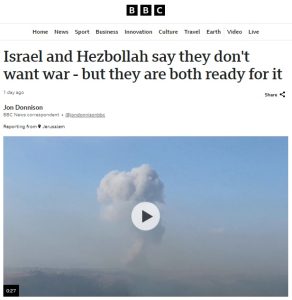
“In a statement, Hezbollah said this was the first phase of its response to the Israeli assassination of a senior commander Fouad Shukr in a strike in Beirut on 30 July.”
Another topic of BBC framing is the circumstances of the start of the current conflict between Israel and Hizballah.
Lukiv & Gritten:
“There have been almost daily exchanges of fire across the Israel-Lebanon border since the day after the start of the war between Israel and Hamas in Gaza on 7 October.”
Live Page:
“For the past 10 months, Israel and Hezbollah have been trading fire across the border.” [Jon Donnison 08:37]
“Cross-border fire between Hezbollah and Israel has increased since 7 October, after Hamas’s attacks on southern Israel, which saw around 1,200 people killed and 240 taken hostage.” [09:26]
Donnison:
“Tens of thousands of people living there [northern Israel] have been evacuated from their homes since the start of the war in Gaza. Many have lost their businesses.”
Notably, none of the BBC’s extensive reporting bothered to inform BBC audiences that Hizballah initiated the current round of conflict when it launched an unprovoked attack on Israel on October 8th and that had it not done so, there would have been no “exchanges of fire”.
Similarly, BBC audiences find portrayals of the Second Lebanon War which fail to clarify that Hizballah initiated that conflict too.
Lukiv & Gritten: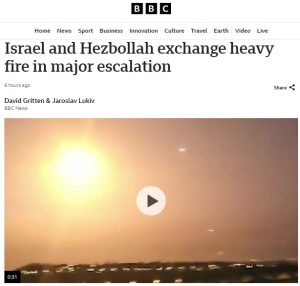
“Israel’s attack on Hezbollah at around 04:30 (01:30 GMT) on Sunday was its biggest since the full-scale war between them in 2006.”
Donnison:
“The Israeli military says around 100 fighter jets carried out what it described as pre-emptive strikes on Hezbollah targets across southern Lebanon on Sunday morning. Hezbollah later fired rockets and missiles into northern Israel.
If that 100 figure is correct, it would be the largest Israeli attack on Lebanon since the full-scale war between Israel and Hezbollah in 2006.”
The report by Lukiv and Gritten also includes a quote mentioning that war:
“Lebanese Prime Minister Najib Mikati – whose government has little influence over Hezbollah – said he was “holding a series of contacts with Lebanon’s friends to stop the escalation”.
He called for a halt to the “Israeli aggression” and the implementation of the UN Security Council resolution which ended the 2006 war.”
BBC audiences are not informed that the resolution concerned is UN SC resolution 1701, what it entails, or that successive Lebanese governments and the UN ‘peacekeeping’ forces tasked with enforcing that resolution have completely failed to implement it throughout the past 18 years.
The report by Lukiv and Gritten, the report by Donnison and three of the items appearing on the Live Page [08:37, 09:19 and 12:31] all promote versions of a map which portrays the Shebaa Farms (Mount Dov) area using a different colour to the rest of the Golan Heights.
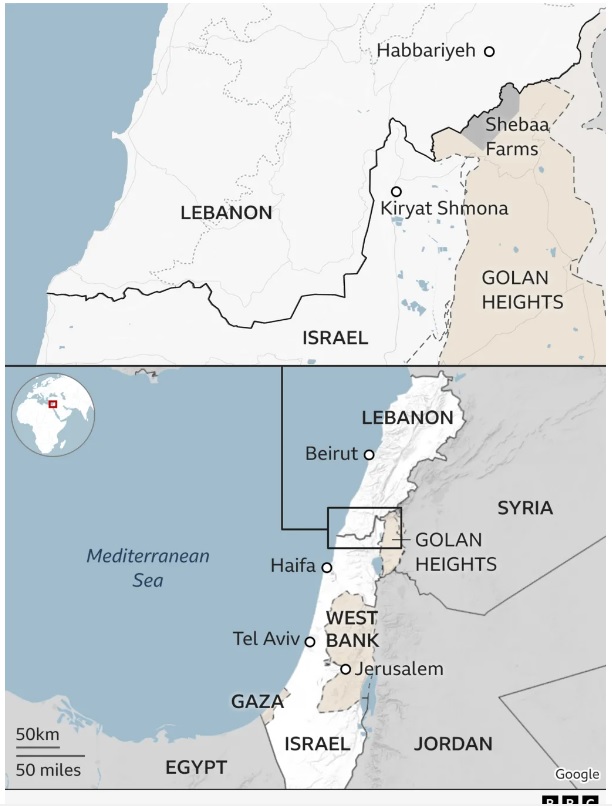
In other words, as has long been its practice, the BBC is promoting Hizballah’s baseless claim that the Shebaa Farms area is Lebanese territory held by Israel – which is one of the pretexts used by that terrorist organisation to ‘justify’ its continued existence.
As we see, readers of the BBC’s coverage of events of August 25th found no small amount of selective framing of the background and context to those events. The BBC’s portrayal of the events themselves will be discussed in part two of this post.
Related Articles:

